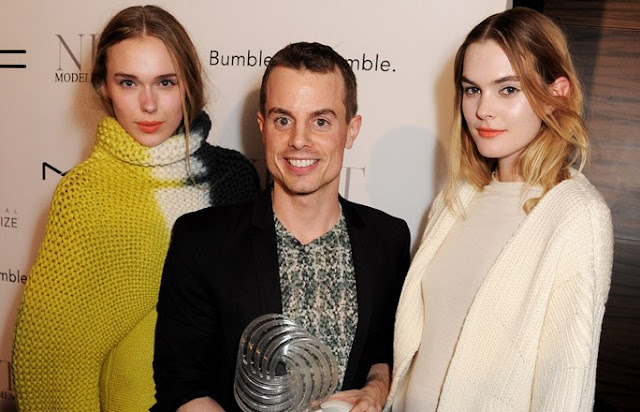In 2012, the charming and talented Christian Wijnants not only
won the European regional finals of the Woolmark Prize, but also went on to wow the judges at the global
final, winning the coveted International Woolmark Prize. His winning IWP entry started with the idea of exploring a single piece of yarn's full potential; Wijnants employed the shibori technique and created a unique shape which moulded wool around the body, as a sculptor might mould clay around a figure. Wijnants has been showing at Paris Fashion Week for over 18 seasons and is stocked in over 60 stores around the world--if there's anyone who knows a thing or two about the talents needed to make it as an emerging designer, it's this guy! Which is why he was the perfect choice to be a part of this year's Woolmark Prize Asia judging panel, alongside Vogue China's Angelica Cheung, global head of creative for Calvin Klein Kevin Carrigan and JOYCE's Bartley Ingram.
What impact does an award like the
International Wool Prize have on participating designers?
It’s very important for a young designer’s
career. It’s a very good
opportunity to show your work to a very wide audience: journalists, buyers,
people in general. I’ve done a
couple of competitions, but this is definitely the one that brought me the most
visibility, new customers and new buyers coming in to buy the collection. It’s great to have this event to help
designers express themselves – it’s very important.
What does it mean to have the Woolmark logo associated
with your brand?
It’s a symbol of a quality that is timeless
and has longevity. You want to
associate your brand with this type of trademark, a sign that the brand is on a
certain level. That’s what I also
enjoy about Woolmark. Almost
everyone can afford to have a Merino sweater, so it’s also luxury, but a very
affordable, accessible luxury.
It’s not just promoting a brand.
There’s something noble in a natural fibre that the Earth is producing,
that has heritage.
We often hear about cashmere, silk
and innovative new fabrications, but what is so special about wool?
What nature has created is good for many
reasons, like the natural elasticity and comfort in wool. There is the fact that it keeps you warm
in winter, and then in the summer it keeps the body temperature at a certain
level. There are also many ways to
use the fibre in contemporary interpretations. It can be mould around the body in very sensual, feminine
ways. You have so many variations
and options, I would almost say there is no reason to invent new ones, but of
course people always like to change and to try other thinks. Thanks to the IWP, it’s great to see
what else can be done with wool and to educate younger generations to respect nature,
to see what our planet has to offer. You can do so much with wool, you don’t
have many boundaries.
How did you use wool in your winning design?
I wanted to bring homage to that fibre, and
to try to show that you can really bring excitement, freshness and novelty to a
garment with just one yarn. So I
challenged myself by using just one yarn, knitting and hand-dyeing most of the
collection by hand. I find it very
interesting that you can do so much with even raw, untreated wool, and that’s
why I also enjoyed seeing how this year’s candidates interpreted it.
As one of the judges for the 2013 prize, what did you
look for amongst the nominees?
There is the emotional impact, when you
just feel it’s right. Of course,
the whole idea of the IWP is to choose an ambassador who is going to use and
promote wool in new and innovative ways.
So creativity and innovation are important to show how young people can
bring a new perspective on this fibre.
What do you think of young Asian fashion designers?
I’ve been to Asia many times before, but
this was my first experience looking at Asian designers. It was very interesting because I
sometimes think that, in Europe, we don’t accord as much importance any more to
traditions or to our own culture.
While here, I saw a few collections still had that touch. I find it’s a very noble thing to do,
to reflect your roots and your history, but to still try to interpret it in a
new way.
See more from the Woolmark Prize here.
x.

















No comments:
Post a Comment